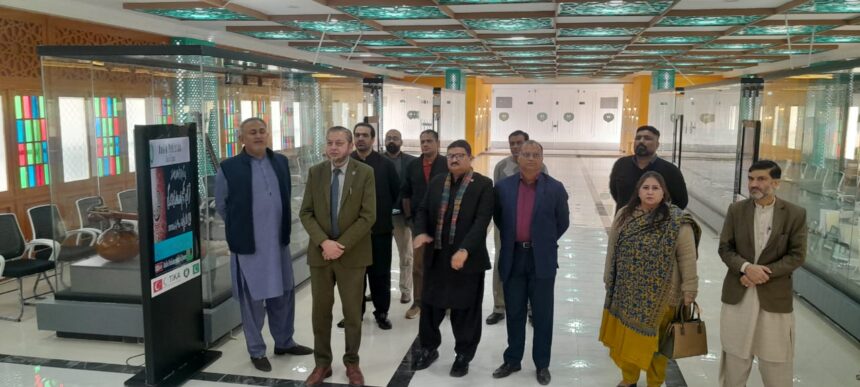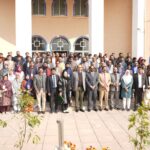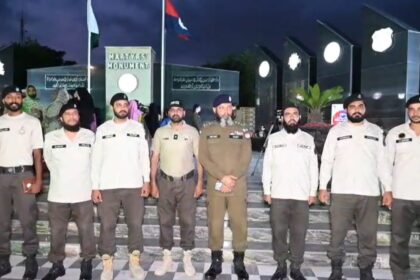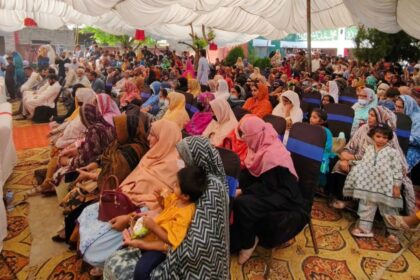Islamabad (Special Report by Changiz Khan Jadoon): The Vice Chancellor of Islamia University Bahawalpur, Professor Dr. Muhammad Kamran, paid an important visit to Radio Pakistan Islamabad. The visit held historical and academic significance, as it focused on media cooperation, educational development and the promotion of national heritage. Upon his arrival, he was warmly received by Director General Radio Pakistan, Muhammad Saeed Sheikh, and Station Director Islamabad, Imran Javed. The visit turned into a meaningful academic and historical engagement, highlighting Radio Pakistan’s valuable legacy for the younger generation.
Professor Dr. Kamran was given a detailed tour of Radio Pakistan’s historic museum, which houses rare equipment that played a major role in Pakistan’s early broadcasting history. He viewed old radio sets, recording devices, equipment used in historic transmissions, and original machinery that is still preserved. A key point of interest for the Vice Chancellor was the first radio station console from which the announcement of Pakistan’s independence was aired. He closely examined its structure, technical features and historical significance. This was the same location where the iconic words “This is Radio Pakistan” were broadcast on 14 August 1947. It is believed that this radio station was designed by Marconi, the inventor of radio.
During the visit, Dr. Kamran also saw the microphone used by Quaid-i-Azam Muhammad Ali Jinnah for his historical speeches. Standing before it, he remarked that it was not just a microphone, but a witness to Pakistan’s struggle and the creation of the nation. He appreciated Radio Pakistan’s efforts in responsibly preserving such national heritage.
The Vice Chancellor also reviewed the archives, classic broadcasting equipment and old recording instruments. He said these relics connect the younger generation with the country’s history and serve as valuable material for research and academic work.
Dr. Kamran later visited Radio Pakistan’s FM 101 station, where he was shown modern broadcasting systems, live control rooms and on-air studios. He also participated in a live transmission, speaking about the educational initiatives of Islamia University Bahawalpur, the promotion of research, new academic programs and the development of media studies. He said radio remains an important medium of communication, especially for delivering positive and meaningful messages to the youth, and that FM channels play a significant role in youth guidance, national values and social awareness.
A major part of the visit was a special interview recorded in Radio Pakistan’s modern podcast studio, conducted by Station Director Islamabad, Imran Javed. In the interview, the Vice Chancellor discussed the university’s achievements in higher education, its future strategy and the need for educational reforms in Pakistan. He said that collaboration between universities and national institutions like Radio Pakistan helps promote research and creative work. He emphasized stronger ties between academic and media sectors, stating that Pakistan’s future lies in better cooperation between knowledge, research and communication.
Dr. Kamran’s visit is being seen as highly significant. Radio Pakistan, which has shaped national narrative and contributed to social and cultural development for more than seven decades, is a key national institution. The Vice Chancellor’s visit reflects that educational institutions and national media can work together for positive social change.
He suggested that students from the university’s media studies department should be given internship and practical training opportunities at Radio Pakistan to enhance their professional skills. The management welcomed the proposal and assured full cooperation.
Overall, the visit was successful, informative and historically important. Dr. Kamran not only observed Radio Pakistan’s rich heritage but also appreciated its modern advancements and technical progress. The visit is expected to open new avenues of cooperation between the two institutions and give new direction to educational and broadcasting activities in the country. It stands as a reminder that Pakistan’s academic institutions and national media are moving forward together toward a more informed and enlightened society.











